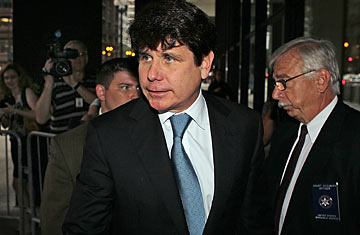
Former Illinois Governor Rod Blagojevich arrives at court for his trial July 20, 2010 in Chicago, Illinois.
(2 of 2)
"I don't think jurors hold it against you for not testifying," says Purdom. "It happens all the time. In the big scheme of things, if someone like Robert, who comes across very well and has fewer areas of vulnerability, [has] testified, it may be more effective than someone who has can't stand up under cross-examination as well." Purdom adds that "it's a delicate dance when there are multiple defendants, to put forth your best defense without inadvertently damaging a co-defendant."
"I think [Robert] was fantastic, the best witness I've seen in five years," said trial lawyer Terry Sullivan, a former Cook County prosecutor in Illinois, who has been observing the trial as a trial expert for WGN-TV. "I think he was credible. I think the jury liked him and I don't think the prosecution got very far with him. I think he was a really good witness for the defense. He helped Rod a lot, a lot more than anybody expected, including the prosecution." After his brother's testimony, Rod posed for a few photographs outside the courthouse, then turned to the crowd and said, "I'm proud of my brother."
Still, Robert, a Nashville businessman, testified that he had reservations about coming to help his brother. "Rod's brand was tarnished," Robert said on the stand. "His standing in the polls was low." But Robert's wife, Julie Blagojevich, testified that she encouraged her husband to foster a relationship with his brother. "I always had it in the back of my head what my parents told us," Robert testified. "When they were gone, all we would only have each other."
As children, they were "tied at the hip," and "very close," Robert Blagojevich told TIME. "I was the older brother and I was expected to be a little more responsible," he said. "I took that role seriously." When they were kids, they used to play dentist, extracting pig teeth from an apple-stuffed hog after their father and his friends ate the pork brains during a Serbian orthodox saint's feast day. Always, it seemed that Rod was trying to emulate Robert, if not literally trying to follow in his footsteps — just as Robert preceded Rod in the witness stand. During high school, Rod followed Robert to Chicago's Lane Tech High School, but transferred to Foreman High School after not making the basketball team, because "he had not had the kind of success in sports that I did," says Robert Blagojevich, a three-sport school athletic star.
After Robert earned a baseball scholarship and later enrolled in ROTC to pay for his remaining three years at the University of Tampa, Rod followed him to Florida. "My parents always wanted us to be together, so he came down for a couple of years then transferred out to Northwestern after I graduated," Robert says.
Growing up, the brothers shared a bedroom, in their parents two-bedroom, five-room home on Chicago's Northwest side. They'd tape Folgers coffee cans in the dining room and kitchen doorways, then run up and down the carpeted strip playing basketball with Styrofoam ornaments until the landlord from downstairs would start pounding for them to stop. "We did things we shouldn't have done in retrospect," Robert says. "We never broke the law, but we did stupid things." Along with two other neighborhood boys, they'd unleash fire hydrants until their neighbors' basements would flood, among several other pranks. "We were co-collaborators," Robert says. "I'm not going to say any one of us had a better idea than the other, but we'd kind of game it and would just go do it." Years later, federal prosecutors are trying to prove that the siblings are co-collaborators again.
As chair of Friends of Blagojevich, the then-governor tasked his brother in August 2008 with raising $2.5 million before new legislation capped such donations on Jan. 1, 2009. Robert testified that the campaign had been rapidly losing donors after news of a potential federal investigation swirled around his brother. Part of the problem was Rod Blagojevich's alleged association with now-jailed Chicago political fundraiser and real estate developer Antoin Rezko and former fundraiser Chris Kelly, who later committed suicide in September 2009.
"I knew he was under a lot of pressure from the issues he had in Springfield to wanting to raise money," Robert Blagojevich said on the stand. "I knew there were issues with Tony Rezko and Chris Kelly, but his argument to me, and I was assured by people around me, [was] 'You're not going to do anything wrong. You don't mix fundraising with government and policy, so you'll be fine." Robert Blagojevich testified that he never crossed any lines he shouldn't have. "People were always nibbling at me, as a fundraiser, to get them something in exchange for campaign funds, and I resisted," he said. But pressed on the intersection of politics and government, he admitted: "Sometimes they bleed over."
Closing arguments begin on Monday.
